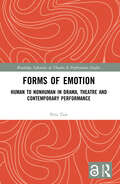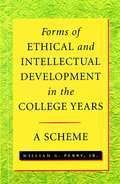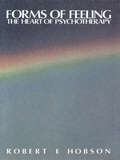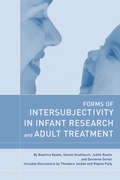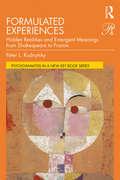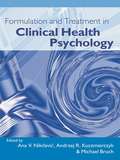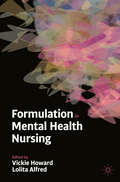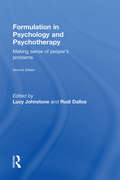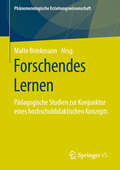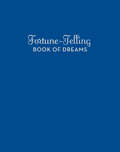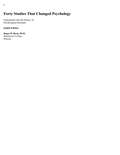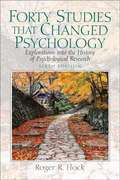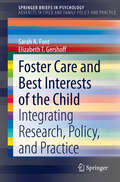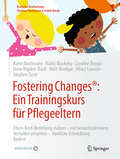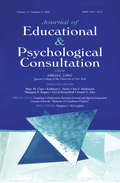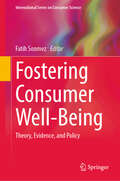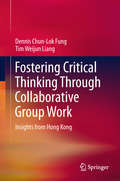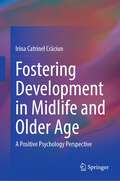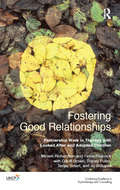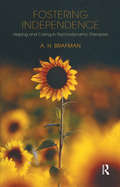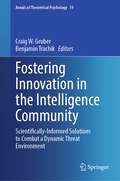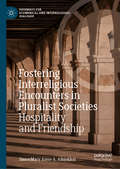- Table View
- List View
Forms of Emotion: Human to Nonhuman in Drama, Theatre and Contemporary Performance (Routledge Advances in Theatre & Performance Studies)
by Peta TaitForms of Emotion analyses how drama, theatre and contemporary performance present emotion and its human and nonhuman diversity. This book explores the emotions, emotional feelings, mood, and affect, which make up a spectrum of ‘emotion’, to illuminate theatrical knowledge and practice and reflect the distinctions and debates in philosophy, neuroscience, psychology, and other disciplines. This study asserts that specific forms of emotion are intentionally unified in drama, theatre, and performance to convey meaning, counteract separation and subversively champion emotional freedom. The book progressively shows that the dramatic and theatrical representation of the nonhuman reveals how human dominance is offset by emotional connection with birds, animals, and the natural environment. This book will be of great interest to students and researchers interested in the emotions and affect in dramatic literature, theatre studies, performance studies, psychology, and philosophy as well as artists working with emotionally expressive performance.
Forms of Ethical and Intellectual Development in the College Years: A Scheme
by William G. PerrySince its original publication in 1970, this landmark book by William Perry has remained the cornerstone of much of the student development research that followed. Using research conducted with Harvard undergraduates over a fifteen-year period, Perry derived an enduring framework for characterizing student development--a scheme so accurate that it still informs and advances investigations into student development across genders and cultures. Drawing from firsthand accounts, Perry traces a path from students' adolescence into adulthood. His nine-stage model describes the steps that move students from a simplistic, categorical view of knowledge to a more complex, contextual view of the world and of themselves. Throughout this journey of cognitive development, Perry reveals that the most significant changes occur in forms in which people perceive their world rather than in the particulars of their attitudes and concerns. He shows ultimately that the nature of intellectual development is such that we should pay as much attention to the processes we use as to the content. In a new introduction to this classic work, Lee Knefelkamp--a close colleague of Perry's and a leading expert on college student development--evaluates the book's place in the literature of higher education. Knefelkamp explains how the Perry scheme has shaped current thinking about student development and discusses the most significant research that has since evolved from Perry's groundbreaking effort. Forms of Ethical and Intellectual Development in the College Years is a work that every current and future student services professional must have in their library.
Forms of Feeling: The Heart of Psychotherapy
by Robert F. HobsonFirst published in 1985. Routledge is an imprint of Taylor & Francis, an informa company.
Forms of Intersubjectivity
by Beatrice BeebeWith new discussions by Theodore Jacobs and Regina PallyAdult psychoanalysis has approached the study of intersubjectivity by concentrating primarily on the verbal dialogue, an explicit mode of communication. Infant research, on the other hand, focuses on nonverbal communication and implicit modes of action sequences, operating largely out of awareness, such as interactions of gaze, facial expression, and body rhythms. This book proposes that an integration of these two approaches is essential to a deeper understanding of the therapeutic action.The authors use a dyadic systems model of self- and interactive regulation as a lens for comparing diverse theories of intersubjectivity, both in adults and infants. Building on the definition of intersubjectivity in infancy as correspondence and matching of expressions, the authors offer an expanded view of the presymbolic origins of intersubjectivity. They address the place of interactive regulation, problems with the concept of matching, the roles of self-regulation and of difference, and the balance of self- and interactive regulation. An adult treatment of early trauma is described through detailed clinical case material illustrating both the verbal narrative and the implicit "action dialogue" operating largely outside of awareness.This book includes new discussions by Theodore Jacobs, arguing that nonverbal communication is vitally important to psychoanalysis, and by Regina Pally, arguing that aspects of this book have parallels in neuroscience.
Formulated Experiences: Hidden Realities and Emergent Meanings from Shakespeare to Fromm (Psychoanalysis in a New Key Book Series)
by Peter L. RudnytskyIn Formulated Experiences, Peter L. Rudnytsky continues his quest for a "re-vision" of psychoanalysis by coupling his revival of the unjustly neglected figure of Erich Fromm with his latest groundbreaking research on Ferenczi and Groddeck. Committed at once to a humanistic and to a literary psychoanalysis, Rudnytsky explores the subjective roots of creativity and critiques the authoritarianism that has been a tragic aspect of Freud’s legacy. Through his clinically informed interpretations he brings out both "hidden realities" and "emergent meanings" of the texts and authors he examines, including Shakespeare’s Othello and Macbeth, as well as Milton’s Paradise Lost. A preeminent scholar of the history and theory of psychoanalysis, Rudnytsky displays an interdisciplinary expertise that makes Formulated Experiences truly sui generis and unlike any existing book. Bridging the artificial divide between the academic and clinical worlds, his eloquent championing of the interpersonal and relational traditions will captivate contemporary psychoanalysts and psychotherapists, while his insightful close readings provide a model for psychoanalytic literary critics.
Formulation and Treatment in Clinical Health Psychology
by Michael Bruch Ana V. Nikčević Andrzej R. KuczmierczykHow do clinicians select appropriate treatment strategies to match their clients' needs? Formulation and Treatment in Clinical Health Psychology brings together leading experts in the fields of clinical health psychology and behavioural medicine with the aim of illustrating the formulation and treatment design procedures which they employ in their specialist areas. Each chapter covers the key biopsychosocial parameters, assessment modalities, empirically based treatment strategies and formulation procedures for specific problems. Areas covered include: cognitive-behavioural case formulation in the treatment of alcohol problems psychological treatment of hypertension cognitive therapy for irritable bowel syndrome miscarriage: conceptualisation and treatment of the psychological sequelae. Case studies are employed throughout to demonstrate a link between case formulation, treatment planning and outcome. The practical guidance provided in this volume will prove invaluable for all practising clinicians working in the context of health-related problems.
Formulation in Mental Health Nursing
by Vickie Howard Lolita AlfredThis book offers a comprehensive overview of formulation applied within the mental health nursing context. It presents a contemporary outlook on the role of the mental health nurse, exploring and reflecting on the foundational values-based and person-centred principles of mental health nurse education and practice. Through this timely and accessible textbook, the authors demonstrate how a variety of theories can be used to enhance formulation in practice, ensuring mental health assessment and intervention are meaningfully connected to support patient recovery. Including service user experiences and viewpoints throughout, each chapter also benefits from tailored discussion points to enable learners to develop critical thinking around formulation. An invaluable guide to the field, it provides a clear, up to date and thought-provoking overview of formulation, essential for students and practitioners in clinical psychology or psychotherapy, as well as clinicians working in all areas of mental health and social care, psychology, therapy, and counselling.
Formulation in Psychology and Psychotherapy: Making sense of people's problems
by Lucy Johnstone Rudi DallosThe first edition of Formulation in Psychology and Psychotherapy caught the wave of growing interest in formulation in a clinical context. This completely updated and revised edition summarises recent practice, research, developments and debates while retaining the features that made the first a leading text in the field. It contains new chapters on personal construct formulation, formulation in health settings, and the innovative practice of using formulation in teams. The book sees formulation as a dynamic process which explores personal meaning collaboratively and reflectively, taking account of relational and social contexts. Two case studies, one adult and one child, illustrate the use of formulation from the perspectives of expert clinicians from six different theoretical positions. The book encourages the reader to take a constructively critical perspective on the many philosophical, professional and ethical debates raised by the process of formulating people’s problems. Among the issues explored are: The social and political context of formulation Formulation in relation to psychiatric diagnosis The limitations of formulation Controversies and debates about formulation This readable and comprehensive guide to the field provides a clear, up to date and thought-provoking overview of formulation from a number of perspectives, essential for clinicians working in all areas of mental health and social care, psychology, therapy and counselling.
Forschendes Lernen: Pädagogische Studien zur Konjunktur eines hochschuldidaktischen Konzepts (Phänomenologische Erziehungswissenschaft #10)
by Malte BrinkmannDas Verhältnis von Theorie, Politik und Praxis des forschenden Lernens als Begriff, hochschuldidaktisches Konzept und intersubjektive Handlungsform steht im Zentrum dieses Bandes. Er zielt auf eine kritische Aufarbeitung, Rekonstruktion und Reflexion des forschenden Lernens in bildungs- und praxistheoretischer, phänomenologischer, wissenschaftstheoretischer sowie in hochschul- und allgemein-didaktischer Perspektive. Es werden darüber hinaus produktive Ausblicke für eine Neubestimmung des Verhältnisses von Forschen, Lehren und Lernen in akademischen Kontexten und für die Lehrer/-innenbildung gegeben. Der InhaltForschendes Lernen und die Normalisierung des pädagogischen Blicks • Forschungsnahes Lehren und Lernen an Hochschulen in der Denkfigur des didaktischen Dreiecks • Zum Verhältnis von Lernen und Forschung im Studium: Bildungstheoretische, didaktische und phänomenologische Perspektiven • Anwenden als Forschen • Über Hochschuldidaktik aus der Sicht einer allgemeinen Wissenschaftsdidaktik • Den Musterwechsel anbahnen. Die Praxis in Schule und Unterricht forschend erkundenDer HerausgeberDr. Malte Brinkmann ist Professor am Institut für Erziehungswissenschaft der Humboldt-Universität zu Berlin.
Forschung, die eingreift: Beiträge zur Theorie und Methodik der Beratung (Schriften zur Gruppen- und Organisationsdynamik #13)
by Ina Paul-Horn Tina RablDie Forschungs- und Beratungsprojekte, über die hier berichtet wird, adressieren konkrete Problemlagen unterschiedlicher Organisationen bzw. Personengruppen. Die Beispiele beschreiben eine Vielfalt von Anwendungsfeldern von Interventionsforschung und machen insgesamt deutlich, wie eine Wissenschaft aussehen kann, die sich kollaborativ mit Problemen von Menschen in unterschiedlichen Praxisfeldern befasst und Handlungsmöglichkeiten erweitert. Eine so verstandene Wissenschaft konvergiert mit dem Handlungsfeld der Beratung.
Forschungsmethoden in Psychologie und Sozialwissenschaften für Bachelor
by Margrit Schreier Gerald Echterhoff Walter Hussy Jana F. Bauer Nicole WeydmannDieses Lehrbuch bietet einen leichten Einstieg und verständlichen Gesamtüberblick über die quantitativen und qualitativen Methoden der Psychologie und angrenzender Sozialwissenschaften: alle wichtigen Verfahren, ihre Logik und Einsatzgebiete, Stärken und Schwachpunkte und auch neuere Entwicklungen. Methoden sind das Fundament der Psychologie und aller Sozialwissenschaften und deshalb allgegenwärtig im Studium. Doch das Thema weckt bei manchen auch Sorgen, insbesondere wenn unter Zeit- und Erfolgsdruck gelernt werden muss. Aber: Keine Angst vor den Forschungsmethoden! Die 3. Auflage wurde vollständig überarbeitet und enthält Fallbeispiele, Definitionen, Tipps für die Praxis, Lernziele, Kontrollfragen und vertiefende Literatur. Lern-Tools für Studierende sowie Abbildungen und Foliensätze zum Download für Dozierende finden sich darüber hinaus auf www.lehrbuch-psychologie.springer.com.
Fortune-Telling Book of Dreams (Fortune-Telling)
by Chronicle BooksA handy little reference guide packed with information to help you predict your future through interpreting your dreams.Inspired by a vintage book, this delightful guide deciphers dreams to predict the future. It compiles more than one thousand dream symbols and reveals what they portend for the dreamer. This handy little book is irresistible to pick up; its content is so compelling, it’s impossible to put down.
Forty Studies That Changed Psychology
by Roger R. HockRoger Hock’s Forty Studies provides a glimpse of the science of psychology, unraveling the complexities of human nature. This book provides a more in-depth look and analyses that cannot be found by reading a textbook or research alone. It has the original studies, research & analysis about the most famous studies in psychological history.
Forty Studies That Changed Psychology
by Roger R. HockThis unique book closes the gap between psychology textbooks and the research that made them possible by offering a first hand glimpse into 40 of the most famous studies in the history of the field, and subsequent studies that expanded upon each study's influence. Readers are able to grasp the process and excitement of scientific discovery as they experience an insider's look at the studies that continue today to be cited most frequently, stirred up the most controversy when they were first published, sparked the most subsequent related research, opened new fields of psychological exploration, and changed most dramatically our knowledge of human behavior.
Forty Studies That Changed Psychology: Explorations into the History of Psychological Research (6th Edition)
by Roger R. HockThis book, useful for courses in Introductory Psychology, History and Systems in Psychology, and Research Methods, closes the gap between psychology textbooks and the research that made them possible by offering a first hand glimpse into 40 of the most famous studies in the history of the field, and subsequent studies that expanded upon each study's influence.
Foster Care and Best Interests of the Child: Integrating Research, Policy, and Practice (SpringerBriefs in Psychology)
by Elizabeth T. Gershoff Sarah A. FontThis brief examines the U.S. foster care system and seeks to explain why the foster care system functions as it does and how it can be improved to serve the best interest of children. It defines and evaluates key challenges that undermine child safety and well-being in the current foster care system. Chapters highlight the competing values and priorities of the system as well as the pros and cons for the use of foster care. In addition, chapters assess whether the performance objectives in which states are evaluated by the federal government are sufficient to achieve positive health and well-being outcomes for children who experience foster care. Finally, it offers recommendations for improving the system and maximizing positive outcomes. Topics featured in this brief include: Legal aspects of removal and placement of children in foster care.The effectiveness of prior efforts to reform foster care.The regulation and quality of foster homes.Support for youth aging out of the foster care system.Racial and ethnic disparities in the foster care system. Foster Care and the Best Interests of the Child is a must-have resource for policy makers and related professionals, graduate students, and researchers in child and school psychology, family studies, public health, social work, law/criminal justice, and sociology.
Fostering Changes®: Eltern-Kind-Beziehung stärken – mit herausforderndem Verhalten umgehen – kindliche Entwicklung fördern
by Stephen Scott Hilary Lawson Karen Bachmann Kathy Blackeby Caroline Bengo Drew Bigden-Slack Matt WoolgarIn Deutschland leben etwa 90.000 Kinder und Jugendliche in Pflegefamilien. Viele dieser Kinder und Jugendlichen weisen psychische Störungen, erhebliche Verhaltensauffälligkeiten oder körperliche Einschränkungen auf. Hierdurch können Pflegeeltern schnell an ihre emotionalen und erzieherischen Grenzen kommen; dies führt oft zu einem Abbruch der Platzierung. Ein "Fostering Changes"-Kurs hat zum Ziel, Pflegeeltern die erforderlichen Kenntnisse und erzieherischen Fertigkeiten für den erfolgreichen Verlauf einer Platzierung zu vermitteln.Basierend auf aktuellen Methoden der Erwachsenenbildung vermittelt der Kurs in 12 praxisnahen Einheiten im Gruppensetting Wissen und praktische Fähigkeiten zu Trauma, Bindung und Verhaltensmodifikation. Zu den per Rollenspiel, Impulsvortrag oder Videosequenz vermittelten Themen gehören u.a. Verhaltensanalysen, wirksames Loben, Ich-Botschaften, positive Grenzsetzung sowie Selbstfürsorge.Mehrere Studien konnten dieWirksamkeit des Kurses hinsichtlich der Verminderung von kindlichen Verhaltensauffälligkeiten und Stresserleben der Pflegeeltern sowie einer verbesserten Beziehung zwischen Pflegeeltern und Pflegekind belegen.Neben theoretischem Hintergrundwissen enthält das Manual konkrete Anleitungen zu Vorbereitung, Umsetzung und Qualitätssicherung der einzelnen Einheiten; zusätzliche Materialien sind per Download erhältlich.
Fostering Collaboration Between General and Special Education: Lessons From the "beacons of Excellence Projects" A Special Issue of the journal of Educational & Psychological Consultation
by Emilia C. LopezPublished in 2003, Volume 13, Number 4 of the Journal of Educational and Psychological Consultation. This volume covers looking at ‘Beacons of Excellence Schools’ what they tell us about collaborative practises and examining special and general education collaborative practise in exemplary schools.
Fostering Consumer Well-Being: Theory, Evidence, and Policy (International Series on Consumer Science)
by Fatih SonmezThis book brings together, in one source, a psychologically framed view of consumer well-being. Featuring chapters authored by expert scholars in the field, and encompassing both research and theory, it provides a comprehensive framework for understanding this important area. Each chapter contains a review of theories and evidence, as well as future research directions and policy recommendations. The intended audience for the book includes professionals in a range of areas, including academia, economics, business, media, and government.
Fostering Critical Thinking Through Collaborative Group Work: Insights from Hong Kong
by Dennis Chun-Lok Fung Tim Weijun LiangThis book reports on studies contextualised within the curriculum development of General Studies in primary education and Liberal Studies in secondary education in Hong Kong. Both areas call for a learning environment that is conducive to the use of collaborative group work to foster critical thinking. By employing a mixed-methods approach and undertaking a teaching intervention based on Anderson et al.’s (2001) study, the book evaluates the effectiveness of group work in learners’ development of critical thinking skills and mindsets. In addition, it examines the influence of Chinese culture on the practice of group work. Findings from primary and secondary classrooms are subjected to a comparative analysis, yielding valuable insights into the relevance of group work for promoting critical thinking.
Fostering Development in Midlife and Older Age: A Positive Psychology Perspective
by Irina Catrinel CrăciunThis handbook integrates and discusses a growing evidence base concerning individual development across middle and late adulthood. The book includes a comprehensive analysis of what growth implies within midlife and older age and considers how different developmental areas are intertwined (i.e., physical, cognitive, social and emotional development as well as personality growth). As the gap between theory and practice still constitutes an issue in developmental research, the handbook also aims to provide illustrative examples of prevention and intervention from a positive psychology perspective. These were selected to represent a variety of topics, relevant for individual development where research informs practice, ranging from happiness, grandparenthood, love and sexuality to loneliness, depression, anxiety, suicide prevention and coping with death. This handbook is a must-have resource for students and researchers working in developmental psychology, health psychology, gerontology and, public health. It will also be of interest to practitioners such as counsellors, life coaches, psychotherapists, organizational psychologists, health professionals, social workers or public health planners.
Fostering Good Relationships: Partnership Work in Therapy with Looked After and Adopted Children (United Kingdom Council For Psychotherapy Ser.)
by Geoff BrownThis book explores the importance of effective multi-agency and multi-disciplinary partnership work for the mental health of children and young people in care and adoption. It takes an overall systemic perspective, but the co-authors contribute different theoretical approaches. It focuses on practice, showing how practitioners can draw on their varied theoretical approaches to enhance the way they work together and in partnership with carers and with professionals from other agencies. The book provides a context that looks at the needs of children and young people in the care and adoption systems, the overall importance for their mental health of joined up 'corporate parenting', and national and local approaches to this. It then moves to focus on practical ways of working therapeutically in partnership with others who contribute diverse skills and perspectives, using specific case examples. Additional chapters look at collaborative ways of working with key carers to enhance their therapeutic role. Finally, some of the main elements of partnership collaboration are explored, as well as the challenges of work across agencies and disciplines.
Fostering Independence: Helping and Caring in Psychodynamic Therapies
by A.H. BrafmanIn a series of papers, the author addresses the needs of students, patients, and practitioners of psychodynamic therapies. The work of these professionals with children and with adults is discussed from a pragmatic point of view, stressing the importance of recognizing the needs and capacities of each individual patient. At the same time, the author focuses on the professional's role in the clinical interaction, emphasizing the need to identify and respect what leads him to the consulting room, and what he expects to obtain from this strenous and demanding type of work.
Fostering Innovation in the Intelligence Community: Scientifically-Informed Solutions to Combat a Dynamic Threat Environment (Annals of Theoretical Psychology #19)
by Craig W. Gruber Benjamin TrachikIn response to the increasingly ubiquitous, asynchronous, and pervasive use of cyber technology in everyday life, unique threats to cybersecurity (CS) have emerged requiring innovative and systemic solutions. Of the potential threats, Ubiquitous Technical Surveillance (UTS) presents one of the most acute generalized vulnerabilities facing the broader Intelligence Community (IC), Department of Defense (DoD), and United States Government. While security systems and networks have attempted to adapt to meet these evolving threats, internal organizational structures, culture, and human behavior often lag behind due to the inherent challenges in changing these dynamic variables. It is crucial that scientific disciplines identify systemic and innovative behavioral countermeasures that are informed by sub-disciplines of the psychology and CS literature. Innovative strategies involve collaboration amongst experts from the domains of social psychology, game theory, Bayesian statistics, and the IC, which will be discussed in-depth. A special issue that pulls from cross-disciplinary professionals will have a broad impact for the IC and DOD eliciting wide readership and spurring needed innovation._____________________________________________________________________"Cultivating a culture of innovation, though difficult, is important for any enduring organization. It's downright essential for the US Intelligence Community, which must stay one step ahead of adversaries on surveillance technologies and tradecraft to be effective. This collection of articles brings together insightful research and analysis from diverse domains, moving us closer to the deeper appreciation of innovation and culture that is so urgently needed."David Priess, Ph.D., former Central Intelligence Agency officer and author, The President's Book of Secrets
Fostering Interreligious Encounters in Pluralist Societies: Hospitality and Friendship (Pathways for Ecumenical and Interreligious Dialogue)
by SimonMary Asese AihiokhaiThis book calls attention to ways of fostering dialogue among members of different religious traditions in an era of cultural and religious pluralism. To achieve this, the author analyzes the results of an ethnographic study of Ihievbe, a town in Midwestern Nigeria that is religiously pluralistic. Emphasis is given to hospitality and friendship—two key relational, cultural, philosophical, and theological virtues—as tools for constructing healthy interreligious dialogue that is relevant for our times. A critical study is done on the importance of these two dialogical virtues in the religious expressions of Roman Catholicism, Islam, and Ihievbe Traditional Religion. Preference for ethnographic studies is based on stressing the relevance of context in articulating useful practices of interreligious dialogue. Finally, the book articulates ways the fruits of interreligious dialogue can be celebrated in the liturgical rituals of each religion, especially the three religions that are addressed here.
